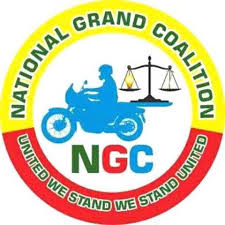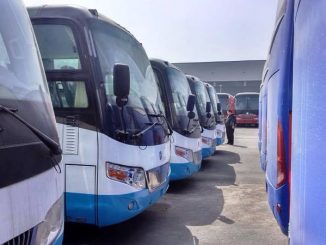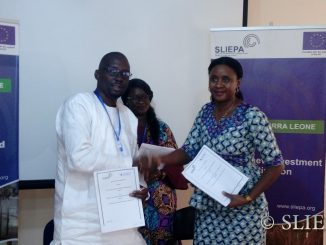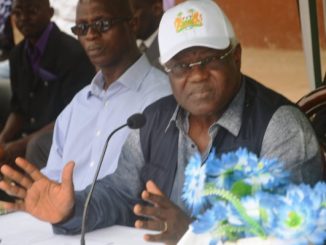
NATIONAL GRAND COALITION PARTY
Position Paper by the National Grand Coalition Party on the Bintumani Ill – National Dialogue Forum on Democratic Consolidation for Peace and National Cohesion
1 Introduction
This brief position paper sets out the views of the National Grand Coalition Party (NGC) on the Bintumani III – National Dialogue Forum on Democratic Consolidation for Peace and National Cohesion in Sierra Leone scheduled to take place 23-25 May 2019 in Freetown. The NGC welcomes the idea of a truly national participatory dialogue aimed at consolidating our democracy to build a strong foundation for peace and national cohesion. To that end, while we welcome the efforts by the government of President Julius Maada Bio to initiate a national dialogue forum, we believe—as we set out below— there are better ways of consolidating peace and national cohesion than the path set out by the government.
Much has already been written and said about Sierra Leone’s political system that perpetuates a vicious cycle in which winner-takes-all translates into benefits and “it’s our turn to eat” for one ethno-regional group at the expense of others. This is a pattern familiar to anyone who has followed Sierra Leone’s postcolonial political trajectory. Our key message is, it’s time to break the destructive cycle and embrace a politics of inclusion. In order to do so, as a nation, we must tackle the root causes of our political malaise. A Peace and National Cohesion Commission for Sierra Leone that addresses symptoms rather than root causes will add to the complexity of commissions with overlapping mandates that drain limited public funds without making a fundamental contribution to peace and national cohesion in Sierra Leone.
NGC finds the government’s case for a new Peace and National Cohesion Commission unconvincing. Rather than creating new institutions, the NGC calls upon the government of Sierra Leone to take concrete steps towards addressing the root causes of our current predicament. For a start, prioritise translation of the Constitutional Review Committee (CRC) recommendations into a White Paper followed by swift enactment and implementation. Similarly, disseminate and implement at least, the key recommendations of the 2004 Truth and Reconciliation Commission (TRC).
In this position paper, section 2 which follows sets out a vision for a peaceful, cohesive Sierra Leone. Section 3 presents a quick thematic overview of the areas we believe where a lack of peace and national cohesion affect ordinary Sierra Leoneans the most. In section 4 we underscore why implementation of both the TRC and CRC recommendations would make the most substantive contributions to peace and national cohesion. In section 5 we highlight areas of agreement and disagreement with the Green Paper on the proposed Peace and National Cohesion Commission. Section 6 ends with NGC’s conclusion and recommendations on the way forward.
2 Vision of a peaceful, cohesive Sierra Leone
A peaceful, cohesive Sierra Leone has at its foundation the rule of law and respect for the human rights of every citizen without discrimination. A Sierra Leone in which the country is greater than its diverse, constituent parts but in which those parts exist in harmony, creating a society in which each citizen feels appreciated and respected with a positive sense of being Sierra Leonean. A peaceful and cohesive Sierra Leone is one in which Sierra Leoneans feel a sense of pride and joy in their family and communal life, in their nationhood; a nation-state rather than a state of many nations with little in common and much distrust between them. This is a Sierra Leone where there is a meaningful social contract that binds those led and their leaders; citizens and the state, in which citizens have obligations as Sierra Leoneans and in which they are able to hold their leaders accountable for upholding their side of the bargain.
As the Green Paper states, “As a country, we lack a common nation[al] identity.” Moreover, in nearly 60 years of independence, we have not made a concerted effort to build this sense of national identity. Worse, political leaders and elites fuel ethnic divisions, fears, and distrust especially during elections when competition for power is intense as a strategy to increase their popular appeal and secure access to state resources. Elites then distribute state resources through patronage as reward for that support to their ethnic base and party affiliates. This is the basis of the disastrous “it’s our turn to eat” syndrome. The national cake is for the favored, connected few to enjoy at the expense of the majority. Political party supporters trade their political allegiance to a particular movement and its leaders in return for direct personal benefit—private rather than public goods—in the form of jobs, promotions, contracts, cash handouts, favors, provision of services, etc. As the national cake, gets smaller relative to the increasing population, and without the rule of law to ensure fair and equitable mechanisms for distribution, the limitations of this strategy become evident. Tensions mount, poverty escalates, and the state apparatus is used to deprive and suppress those left out and excluded.
In the circumstances, a shift to a peaceful, cohesive and inclusive Sierra Leone is a shared responsibility of all Sierra Leoneans. It cannot be just a government of the day initiative, led by a political party anxious to score points against others. We are therefore skeptical that creation of a new Commission is the most effective strategy to bring about this profound change in our political culture and the social dynamics of the country. The preparations leading to the conference, the formulation of the agenda, and above all the contents of the basic document, which ignores some fundamental flaws in our current polity, but seizes the opportunity to ascribe blame to only one political party, all manifest our failure to advance as a country.
In the next section, we outline the main building blocks for a peaceful, cohesive Sierra Leone that are currently missing.
3 Building blocks for a peaceful, cohesive Sierra Leone
We highlight here five essential building blocks for peace and cohesion in Sierra Leone today. These are well-documented elsewhere in countless other studies, reports, and strategies. Although we present them sequentially, there is no hierarchy intended. Indeed, these building blocks are interrelated.
First is access to justice. Today, justice is inaccessible to the majority of Sierra Leoneans. Just think about the number of young people held in custody in remand, often for minor offenses, for periods of time far in excess of the normal sentence for the offense, if found guilty. Think of the land dispute cases clogging the courts in which a land-grabber is able to encroach upon someone’s land and then easily thwart the course of justice using their connections, and an inefficient system of justice. Think of a poor rural widow in dispute with a more powerful elite family and her chances of securing access to a fair hearing. Think of a young man bullied and preyed upon by more powerful elders with no recourse to justice. Refer to recent and earlier abuse of the security apparatus to suppress peaceful protests or bulldoze property without the authority of the courts. These aren’t isolated incidents but the daily reality for all- too-many Sierra Leoneans today. We saw during the war how such injustices can breed a deep sense of anger and resentment that slowly erodes any trust in the state, exacerbates the breakdown in law and order and creates a vicious cycle of attack, reprisal, and further attack.
The second building block is the economy and jobs. A job is much more than a living wage. It means dignity, security, enjoyment of family life, hope, self-respect, a sense of purpose and self-worth. People with jobs are more likely to be stakeholders in society. They have a vested interest in peace, stability, and the rule of law. Yet the reality for so many young and older Sierra Leoneans is the opposite: a life of unemployment and underemployment; an insecure, hand-to-mouth existence on the margins of society; one of eking out a minimal existence doing dirty, dangerous, or demeaning work. For a young woman, it might mean being expected to exchange sexual favors in return for a promotion or even the chance of getting a job in the first place. Managing an economy to produce inclusive growth with job creation at the centre of the strategy is a complex undertaking but essential for peace and cohesion as well as many other positive attributes in society.
A third building block for a peaceful, cohesive Sierra Leone is the political system of governance. The Green Paper correctly draws attention to the resumption of a pattern in Sierra Leone’s politics of increasingly violent, ethno-regional elections and voting patterns that has its roots in our colonial past, emerged in the 1960s, and has reared its ugly head again in latter years. Our winner-takes-all system of governance is partly to blame, which the Green Paper correctly points out. Some people describe Sierra Leone as a “connectocracy”, ruled of, by, and for the well-connected. Patronage lies at the heart of our body politic and is a destabilizing force that undermines sound economic management and decision- making; undermines accountability and delivery of public goods; embeds corruption; and sustains mediocrity.
We must avoid superficial solutions. This is why serious consideration of our constitutional arrangements are in order to create the foundation for peace and cohesion in Sierra Leone. It is time for us to examine an alternative system of governance, perhaps some form of proportional representation that will ensure representation of women, youths and other marginalized groups in our Parliament, district and city councils.
Nation-building is a fourth building block. We cannot take cohesion for granted. In addition to the fundamental principles already mentioned, there is a symbolic (though not without substance) dimension to peace and cohesion. Civic education, a shared understanding of our history, celebration of our diverse cultures, sporting prowess, and performance on the world stage can all make important contributions to peace and cohesion. None of this is possible If there is no shared perception that every citizen has the same rights under the law and is entitled to the same opportunities according to his or her abilities.
We do not claim the above four building blocks represent a comprehensive list, but we believe they are fundamental and a good starting point. Rather than restate what has been stated on many occasions before, we need to focus our attention and energy on implementation of recommendations based on previous analysis. This is the focus of the next section.
4 Implementing TRC and CRC recommendations
Notwithstanding minor criticisms at both the TRC and CRC processes, conclusions, and recommendations, they represent comprehensive exercises, consulting representative cross-sections of Sierra Leoneans as well as experts from around the world to make a series of recommendations. So far only a few TRC recommendations have been implemented. Equally important, as a nation, we have not truly taken to heart the lessons uncovered through the grueling TRC process. Yet if we fail to heed the lessons of history, we are doomed to repeat past mistakes. The pattern of electoral violence and ethno- regional voting are perhaps two of the starkest examples of lessons we should have learned from the TRC but apparently have not.
More recently, the CRC entailed considerable work, effort, and cost—building as it did on the earlier Peter Tucker Commission—to produce a comprehensive set of recommendations for amendments to our constitution to better align it with our contemporary aspirations. In his May 2018 address at the State Opening of Parliament, President Bio committed to examine the recommendations of the Constitutional Review Committee and the accompanying White Paper and to take action. It is odd, therefore, that the Green Paper, though its analysis borders on constitutional matters, is totally silent on the CRC or changes to the constitution.
In our view, these two foundational documents are the starting point for any serious effort to enhance peace and national cohesion in Sierra Leone. To ignore or sidestep them is wasteful and counterproductive and raises questions about the sincerity of any stated commitment to participatory processes or national consultation. This leads us onto a brief discussion of the Green Paper on the proposed Peace and National Cohesion Commission, the subject of the next section.
5 NGC’s view on the Green Paper
As we have already noted in this position paper, there are areas of agreement with the Green Paper in describing Sierra Leone’s current ailments that undermine peace and cohesion. However, in our view, the Green Paper suffers from many severe shortcomings. We highlight a few below.
1) The Green Paper frames the issue as if the All People’s Congress Party (APC) is solely or primarily responsible for Sierra Leone’s political ailments. At NGC, we see the poor governance of the last APC regime (and indeed that of previous ones) as symptomatic of our complex systemic political order. While we are on record as commending some aspects of the Bio regime’s programme, we have also lamented those elements of continuity with the past APC regime. In order to find workable solutions to our predicament, we shall have to eschew finger-pointing and the blame game for a collective effort recognizing we all have roles to play, not just all political parties but society at large.
2) Paradoxically and perhaps perversely, the Green Paper runs the risk of further enflaming the simmering tensions between the ruling Sierra Leone People’s Party (SLPP) and APC. In politics perceptions quickly become realities and there is a danger that the entire effort to create a Peace and National Cohesion Commission can be seen as an integral part of the conflict, thus undermining peace.
3) Set within the framework of a broader, more strategic approach that aimed to tackle the root causes of our current challenges, some of the recommended actions the Green Paper sets out in Paragraph 26 (eg teaching peace study courses in the first year of university or setting up peace clubs) might be useful. Outside of such a framework, which the Green Paper fails to provide, there is a risk that these are mere gimmicks that absorb much time, effort, and resource, but have limited to no impact at all, or worse, have a negative impact.
4) In calling for the creation of a new institution, the Green Paper fails to interrogate the reasons for the poor performance of so many existing institutions. We have a tendency in Sierra Leone to create new institutions to partially or wholly compensate for the failures of existing ones. This results in a proliferation of poorly conceived, under-resourced institutions with overlapping mandates that are a drain on limited public resources, compound coordination challenges and institutional territorialism, and simply make getting things done in Sierra Leone harder, not easier. Moreover, with our current system of ethno-regional patronage, new institutions are often captured by the “it’s our turn to eat” syndrome resulting in more “square pegs in round holes”—ill-suited appointees unable to perform well while talented Sierra Leoneans languish
underutilized and discriminated against.
5) As we review the long shopping list of things that the Commission will do, we ask what are the
roles of other agencies? Aren’t there risks of duplication and stepping on the toes of other agencies? Have these proposed Commission responsibilities been clearly demarcated as gaps in the general landscape in Sierra Leone?
6) It is against the backdrop of the previous two points that we worry the Green Paper ascribes almost magical qualities to the new Commission. For instance, the “Commission will also need to push and lobby for successful policies for achieving the Sustainable Development Goals (SDGs) and work closely with and support policies that respect, promote and protect human rights, including the right to development, increase efforts to reduce inequality and eliminate social exclusion and discrimination and in particular enhancing opportunities for women and girls and advancing the economic, legal and political empowerment of women.” This assumes a Commission with superpowers as advancing the SDGs in the way described has so far been a challenge for all other state institutions. Worse it can be seen to attempt a replication of the government.
7) The Green Paper fails to problematize the role of traditional leaders. Rather, it takes as given their benign position and stature. Without adequate checks and balances, any leader, no matter how revered, can become a party to conflict and undermine peace and cohesion. Similarly, the Green Paper fails to take into account the possibility that civil society organizations can be co- opted by partisan political forces on the side of or against the government and thus undermine peace and cohesion.
😎 The Green Paper is naïve in its expectations of the independence of the Commission. Without constitutional guarantees and protections, relying on the goodwill of the President, the Minister of Finance, and Parliament willfully ignores the nature of our current political system and the almost inevitable elements to use all levers to control the Commission, particularly if its independence is deemed a threat to vested political interests.
9) Finally, the Green Paper states: “The Commission will be set up following extensive consultations across the country, culminating in a national conference on peace building, management and rebuilding of national cohesion.” We believe this puts the cart before the horse. Whether a Commission is needed should emerge from the consultations. To conclude that a Commission is needed makes a mockery of a consultative process. It would be better to enter into consultations with a genuine sense of curiosity and for enquiry to be guided by the synthesis of insights heard from a cross-section of Sierra Leoneans and outside experts. Both the TRC and CRC processes were consultative, one reason why the government should not set aside their conclusions and recommendations.
6 NGC’s conclusions, recommendations, and proposed way forward
We need to break the vicious cycle, rooted in our history, of poor governance predicated upon ethno- regional divisions. This cycle has kept us at or near the bottom of human development indicators and almost all other measures of progress; led us into an 11-year civil war; weakened our institutions and undermined our ability to deal with shocks and disasters; and generally thwarted our aspirations for a peaceful society in a united nation-state. But our past is not our destiny. We can free ourselves from our fragility trap.
We should be realistic. We cannot change deep structural factors that shape our sociopolitical system overnight; these factors shift over years, if not decades. We cannot create or change institutions in the short-term, either, though we can lay foundations now. And even if we can’t change the behavior of all the actors immediately, some can change now. Leadership matters. We welcome the fact that President Bio has placed this important issue on our agenda for consideration. As our current democratically elected President, we believe President Bio could be noted in history as the head of state who helped Sierra Leone break its disastrous cycle of poor governance and thus contributed significantly to peace and social cohesion in Sierra Leone, provided the collective blame is accepted and we collectively agree to move forward.
We have as a precedent and example to this call for leadership, President Ahmed Tejan Kabbah’s legacy. We can credit President Kabbah with frugality in his spending; with working through values of peace, democratic governance and freedoms, and demonstrating a high level of political tolerance and pluralism. President Kabbah appointed people to his cabinet from all the political parties in Parliament and he made real efforts to have regional balance in his appointments. He ensured that all actions taken by his government were in line with the law and the constitution. Above all, he allowed the rule of law to prevail. He did not interfere in matters before the courts. Civil society engagement by government started under President Kabbah’s watch. He always sought the views of civil society before making important national decisions. An example was the peace negotiations leading to the Lomé Agreement. Significantly, he resisted efforts by his party members for special privileges and when the pressure became unbearable he wrote to the party telling them he was President for all Sierra Leoneans and they should allow him to govern as such.
The current post-elections atmosphere remains tense and the two major political parties are positioned in their respective trenches. We call upon President Bio to reduce the tension and pursue detente. President Tejan Kabbah convened meetings in his home with top opposition leaders, and even advised them whenever they were locked in intra-party strife. Peace and national cohesion depend now on President Bio’s ability and willingness to rise above the fracas and demonstrate true leadership.
We are relieved that President Bio is obviously concerned enough about the threats to peace and national cohesion to act. We pledge to work with him and his government as well as other actors in society to strengthen peace and cohesion. We believe there are four steps President Bio’s government should take immediately to strengthen the foundations for peace and national cohesion.
1) As a matter of urgency, revisit the Constitutional Review process by taking urgent steps to study the recommendations and the White Paper to produce a considered government response that Parliament can deliberate upon as soon as possible.
2) Produce an Action Plan for the implementation of TRC recommendations. The Plan should reprioritize those not yet implemented or stalled in implementation and provide the necessary resources and support to expedite execution. Such a Plan must be based on an understanding of the underlying factors hampering speedy implementation of recommendations so far and address these factors.
3) Bintumani III should be the start of a national consultative dialogue process (in our view, it should have been the culmination). The key lesson we learned from our painful encounter with Ebola in 2014 to 2016 was the central importance of community ownership for success. This is true of Ebola and also of supporting peace and national cohesion.
4) Questions of establishing a Commission should be deferred until government has considered what the implementation implications of CRC and TRC recommendations are and what lessons there are to learn from patchy TRC recommendations implementation before resolving whether a new Commission is needed as part of implementing the reforms needed or whether restructuring and rationalization of existing institutions would likely deliver more effective results.
We remind the government that action speaks louder than words, it is within the powers of this current government to avoid taking steps that further undermine peace and national cohesion and such a stance would go some way to reassure detractors as to the sincerity of these efforts. If deeds fail to match words, we are all entitled to feel cynical about the government’s true motives.



